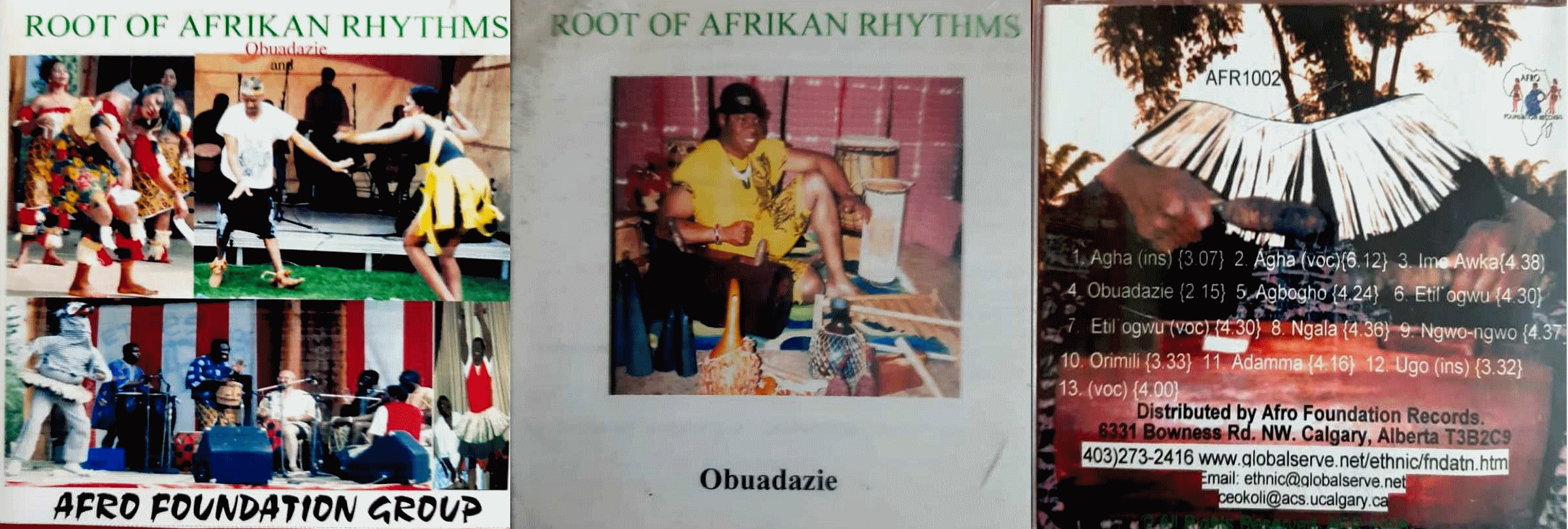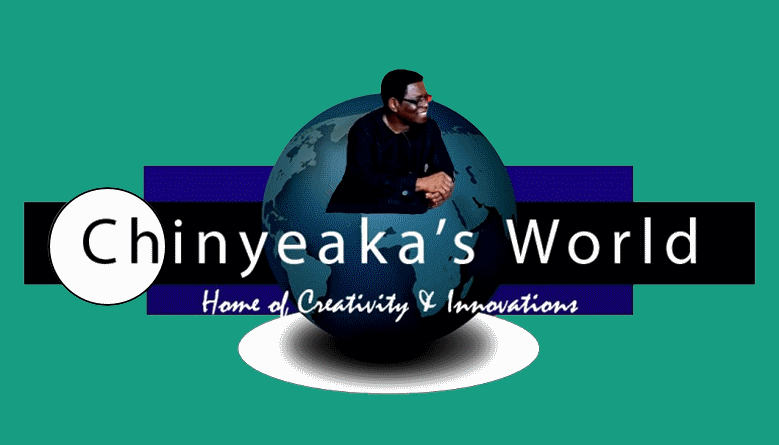
ROOT OF AFRIKAN RHYTHMS © 1997 is an album of artistic songs and rhythms that capture many aspects of traditional African music rhythms. That African music is polyrhythm is evident in the beautiful blending of various instruments and voices. Each voice/instrument sings/plays its own song/music, while complementing what others play. The result is a blend of captivating music rhythms that form a single tune in each track. Each track could be said to consist of many songs in one. This is why we love to call this album ” A DICTIONARY OF AFRICAN ROOT MUSIC RHYTHMS”.
The Source of The Rhythms
All songs in this collection tap their strength from the rich cultures of the Igbo ethnic group of Nigeria (Ndiigbo). It is our belief that almost all African traditional music rhythms could be found in this diverse and fluid culture of Igbo people of Nigeria.
About Igbo Ethnic Group
“Obialu b’onye abiagbuna ya, onosia ka nkpukpu ghalu ikwoya n’azu” (A stranger should never create a problem for the host to avoid developing a hunchback at departure) – Igbo Proverb
Ndiigbo, as the people are called, are among the three major ethnic groups in Nigeria- a country with about 250 ethnic groups, 270 Tribes and over 500 languages! Numbering well over 80 million, they are found mostly in the East, Midwest and Middlebelt parts of Nigeria. Also, they located in various countries in Africa, Europe, Australia, Middle East, Asia, the Caribbean, Americas, Canada and any other part of the world you can think of. There is no village in Africa that you will not find an Igbo person.
Ndiigbo are great travellers. Like all sensitive travellers, they believe in showing love to strangers and visitors. They strongly believe in mutual coexistence of mankind.
“Oje mbaa enwe ilo” (A traveller abhours enmity) – Igbo Proverb
Their love for travelling and association with others place them among the most accommodating ethnic groups in Africa and the world.
Creative, industrious and adventurous, Igbo people are said have one of the best democracies in the world – collective rulership and no Central King! Colonialists, on arrival in Igboland found it difficult to understand how a large group of people could live together and function effectively without a known political set up and a head as obtainable in other democracies!
As travellers, Ndiigbo are very open to adapting to other cultural virtues which enhance the well being of its people. This does not make them loose grip of their rich cultural heritage. Ndiigbo see it as a thing of pride to understand and inculcate other people’s cultures into their own. Wherever they settle, they try to be part of the system. If accepted, they begin to develop the area ever much more than they would develop their own homeland. This is based on their belief that:
“Ebe onye bi k’ona awachi” “Where one lives is where he/she takes care of and develops” -Igbo Proverb
This may explain why they are less discriminatory with regards to ethnic, cultural or racial intermarriages.
The open mindedness of Ndiigbo, together with their acceptance and accommodation of other cultural values account for the fluidity of the cultural evolution of Ndiigbo and the diversity found in Igbo music and dances in particular, and culture in general.
Listen to Agha
{The “a” is sounded like “ar” or “ah”, while “g” is to be said in such a way the “g” and “h” are quickly sounded as if both are one letter}
This song captures various traditional Igbo war chants/rhythms. Igbo people believe that war has to be justified before it is embarked upon. The song talks about pogrom, anger and provocation. It begins with lamentation of the unwarranted slaughter of innocent Ndiigbo- Mothers, Fathers, Brothers, Sisters, Uncles, Aunts, In-laws, Friends have all been murdered in cold blood. Those murdered, the song went on, are blood relations. Their crime is that they happen to come from a different ethnic stock, disliked because they are smart, resourceful, industrious and progressive. The anger of the warriors is justified. They perform the rituals as they prepare for war. The song calls on the weak and cowards not to come out to the erena. “The war will be bloody!” As the sound of Ikoro resounds the final warning “Onye akpakwana Agu aka n’odu, ma odi ndu ma onwulu anwu” (Never touch the Leopard’s tail, be it dead or alive”, the warriors spring into action with the popular Elephantine chant and charge “Nzogbu nzogbu, Enyimba Enyi” -a call for ferocious charge to battle like the stampede of Elephants.
The rhythm of the song is a blend of various Igbo war chants and beats. The presentation and rendition here is spiced with various Igbo War rhythms but tailored close to the Bende/Ohafia war dance rhythms otherwise called “Egwu Abiriba” or “Abiriba war dance” Abia State, Nigeria. The music is dedicated to all Ndiigbo and other Easterners massacred all over Nigeria in 1966 and all those who died in the resultant civil war that followed.
Listen to Imo’ka
This is AEtilogwu dance (Without Voice). This particular song is dedicated to Egwu Im’oka festival of Awka, Anambra State.
Listen to Obuadazie
It is a recreational dance rhythm. The beat draws from various Igbo cultural rhythms, especially the captivating music rhythms that are found around Enugu, Anambra and Ebonyi States in Nigeria. The tune takes its name after the writer. The music is captivating and the dance electric.
Listen to AEtilogwu
This is among the most popular and entertaining dance/music rhythms in Igboland in particular, Nigeria and Africa in general. The name simply means that the dance is so fascinating and thrilling that it smacks of the ordinary. It is as if (supernatural/magic) forces are involved in the music and dancing. It comes in different shades and styles. Acrobatic displays are at times incorporated into the dancing to justify the mystic “would-be magic” involved. This particular song is dedicated to Nkpokiti dance troupe of Umunze, Anambra State who gave Etilogwu music and dance its international recognition.
Listen to Ngala
{The “n” is sounded like a short humming “hm” before “gala”. The last “a” is sounded as if it ends with high sounding “a” as if it is “ar” or “ah”}
The song is a contemporary creation by the writer. In this music, he employs rhythms from various instrument voices. It is a hot tune designed to “show-off” the flexibility, beauty and agility of the dancer. The song is dedicated to the Nkwa Umu Agbogho of Afikpo, Ebonyi State.
Listen to Ngwo-ngwo
Egwu Ngwongwo (vocals)
Listen to Egwu-Ugo
{Egwu in Igbo could mean song, dance, music, or play Ugo is eagle}
The title means, The music, song and dance of the Eagle. It is another type of Etilogwu music. It is an artistic composition of recreational dance and music pattern based on the artist’s experience in music and dance. It is a creative blend of Etil’ogwu dance and music rhythms with Ubeogazi – dance and rhythms. Ubeogazi -means The cry of the guinea fowl. The tune is dedicated to the Etil’ogwu dance troupe of Umuokpu village, Awka. Anambra State, Nigeria
